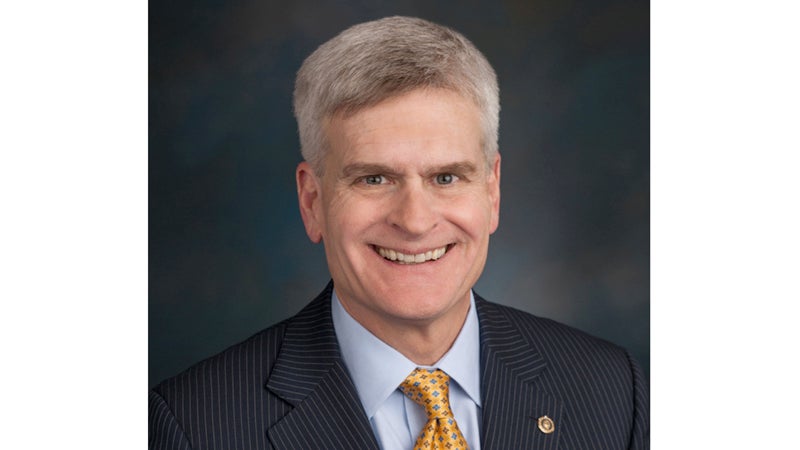Two Bipartisan Cassidy bills to lower prescription costs head to President’s desk
Published 9:33 am Thursday, April 15, 2021

- Senator Bill Cassidy
|
Getting your Trinity Audio player ready...
|
WASHINGTON – Two pieces of bipartisan legislation, the Advancing Education on Biosimilars Act and the Ensuring Innovation Act, introduced by U.S. Senator Bill Cassidy, M.D. (R-LA) and aimed at lowering prescription drug costs passed the U.S. House of Representatives today and now heads to President Biden’s desk to be signed into law.
“Passing these bills in Congress has the potential to lower prescription costs for patients, but also for taxpayers, because taxpayers pay a lot of the bill too,” said Dr. Cassidy. “Th[e Advancing Education on Biosimilars Act] improves awareness for the doctor, and the patient, that these drugs are effective and they’re less expensive. They’re good for your health. They’re good for your wallet. It’s a good piece of legislation.”
The Advancing Education on Biosimilars Act, introduced by Senators Cassidy and Maggie Hassan (D-NH), will enhance education about biosimilar drug products in an effort to increase competition and lower the cost of biologic medicines.
“Biosimilar alternatives can help save lives and lower health care costs, but currently many doctors and patients in New Hampshire and across the country are in the dark about this affordable option,” said Senator Hassan. “I am glad that both chambers have passed our bipartisan legislation to improve education about biosimilar products, and I urge the President to sign this important legislation into law.”
The Ensuring Innovation Act, introduced by Cassidy and U.S. Senators Tina Smith (D-MN) and Roger Marshall (R-KS), will provide clarity for drug exclusivity to prevent awarding market exclusivity to products that do not represent true innovation and unduly delay cheaper generics from entering the market.
“We need to stand up for Americans who are struggling to afford life-saving prescription drugs. This is especially important as we navigate the public health and economic crisis of COVID-19,” said Senator Smith. “The House passage of our bipartisan Ensuring Innovation Act is important progress in the fight to make medications more effective and drive down costs for consumers. The next step is for President Biden to sign this into law.”
“As a physician, and now a U.S. Senator, I believe innovation and competition can have a profound impact on driving down the cost of health care,” said Senator Marshall. “The current regulatory landscape unnecessarily delays patient access to FDA-approved generics. Our bipartisan legislation ensures affordable life-saving medicine while preserving innovation for cutting-edge medicine, and I’m pleased we are one step closer to this becoming law.”
About Advancing Education on Biosimilars Act
Biologics are complex products that may be used to treat serious or chronic conditions, such as diabetes, rheumatoid arthritis, and certain cancers. Biosimilars are highly similar to, and have no clinically meaningful differences from, brand biologic drugs, but are manufactured by different companies. Independent studies have estimated that biologics could save Americans potentially $54 billion over 10 years in health care costs.
The bipartisan legislation would provide educational materials to patients and providers to help improve confidence in the safety and effectiveness of these FDA-approved products. Improved confidence in biosimilars could lead to increased use, which in turn could increase health care savings.
“Today marks yet another achievement supporting the growing demand of biosimilars. I am pleased to see the government taking action to further promote biosimilars, and I commend this bipartisan initiative led by U.S. Senators Maggie Hassan and Bill Cassidy. This bill will now be sent to President Biden and we encourage him to sign this into law. With the passage of the Advancing Education on Biosimilars Act of 2021 (S.164), it is clear Washington wants to lower drug prices by educating patients and providers about lower cost alternatives, but more work needs to be done in promoting biosimilars. Coherus looks forward to continuing to partner with policymakers and regulators to advance biosimilar policies that help taxpayers, Medicare patients, and our provider partners,” said Coherus CEO Denny Lanfear.
“Biosimilars are the next generation of generics and how we can tackle the single biggest driver of prescription drug spending. With increased use of biosimilars and better patient access to these life-changing therapies, the U.S. could save $100 billion in the next five years,” said Meaghan Rose Smith, Executive Director of the Biosimilars Forum. “Thanks to Dr. Cassidy’s leadership and support of biosimilars, this bill will increase education while empowering physicians and families.”
Senators Cassidy and Hassan have previously worked together to help lower the cost of health care, and recently led successful efforts to include a provision in the year-end package that was signed into law to help end the absurd practice of surprise medical billing. Additionally, in 2019, President Trump signed into law bipartisan legislation introduced by Senators Cassidy and Hassan to close a loophole in the Medicaid rebate program that results in big pharmaceutical companies overcharging taxpayers. The bipartisan legislation will save taxpayers approximately $3.1 billion over the next 10 years.
About Ensuring Innovation Act
If a company invents an innovative new drug, they are rewarded with exclusive right to sell that drug for a period of time. However, companies have found loopholes to claim new innovations on the same drug, that aren’t really innovations, to extend their exclusivity and prevent cheaper generics from coming to market. The Ensuring Innovation Act would close loopholes to prevent awarding market exclusivity to products that do not represent true innovation and unduly delay cheaper generics from entering the market.



